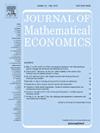Present bias: Understanding zero leverage policy and unstable capital structure
IF 0.7
4区 经济学
Q3 ECONOMICS
引用次数: 0
Abstract
We develop a dynamic capital structure model for a firm controlled by a present-biased entrepreneur without commitment. For sophisticated entrepreneurs, the costs associated with debt issuance act as a de facto commitment device, steering them towards a “zero-leverage strategy” due to the prohibitive costs associated with repeated debt refinancing. In contrast, naive entrepreneur fails to perceive future refinancing, this erroneous belief undermines the commitment value of debt issuance cost and leads to “unstable capital structure”. Borrower naivete provides an opening for financial intermediaries and creditors to impose increased flotation costs and elevated credit spreads. Our analysis further suggests that implementing covenants tied to financial leverage ratios alongside short-term debt obligations can serve as effective strategies to mitigate the impacts of entrepreneurial naivete.
当前倾向:理解零杠杆政策和不稳定的资本结构
我们建立了一个动态的资本结构模型,该模型是由一个没有承诺的、有现在偏见的企业家控制的企业。对于经验丰富的企业家来说,与债务发行相关的成本实际上是一种承诺工具,由于反复债务再融资带来的高昂成本,它们将转向“零杠杆战略”。相比之下,天真型企业家未能感知到未来的再融资,这种错误的信念破坏了债务发行成本的承诺价值,导致“资本结构不稳定”。借款人的天真为金融中介机构和债权人提供了增加上市成本和提高信贷息差的机会。我们的分析进一步表明,实施与财务杠杆率和短期债务义务相关的契约可以作为减轻创业幼稚影响的有效策略。
本文章由计算机程序翻译,如有差异,请以英文原文为准。
求助全文
约1分钟内获得全文
求助全文
来源期刊

Journal of Mathematical Economics
管理科学-数学跨学科应用
CiteScore
1.70
自引率
7.70%
发文量
73
审稿时长
12.5 weeks
期刊介绍:
The primary objective of the Journal is to provide a forum for work in economic theory which expresses economic ideas using formal mathematical reasoning. For work to add to this primary objective, it is not sufficient that the mathematical reasoning be new and correct. The work must have real economic content. The economic ideas must be interesting and important. These ideas may pertain to any field of economics or any school of economic thought.
 求助内容:
求助内容: 应助结果提醒方式:
应助结果提醒方式:


